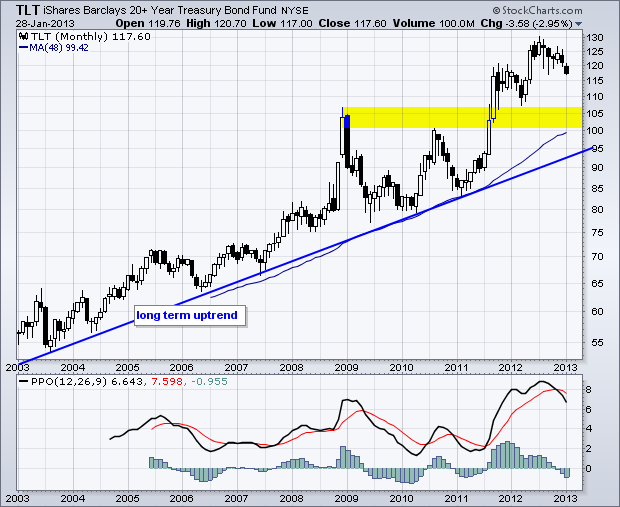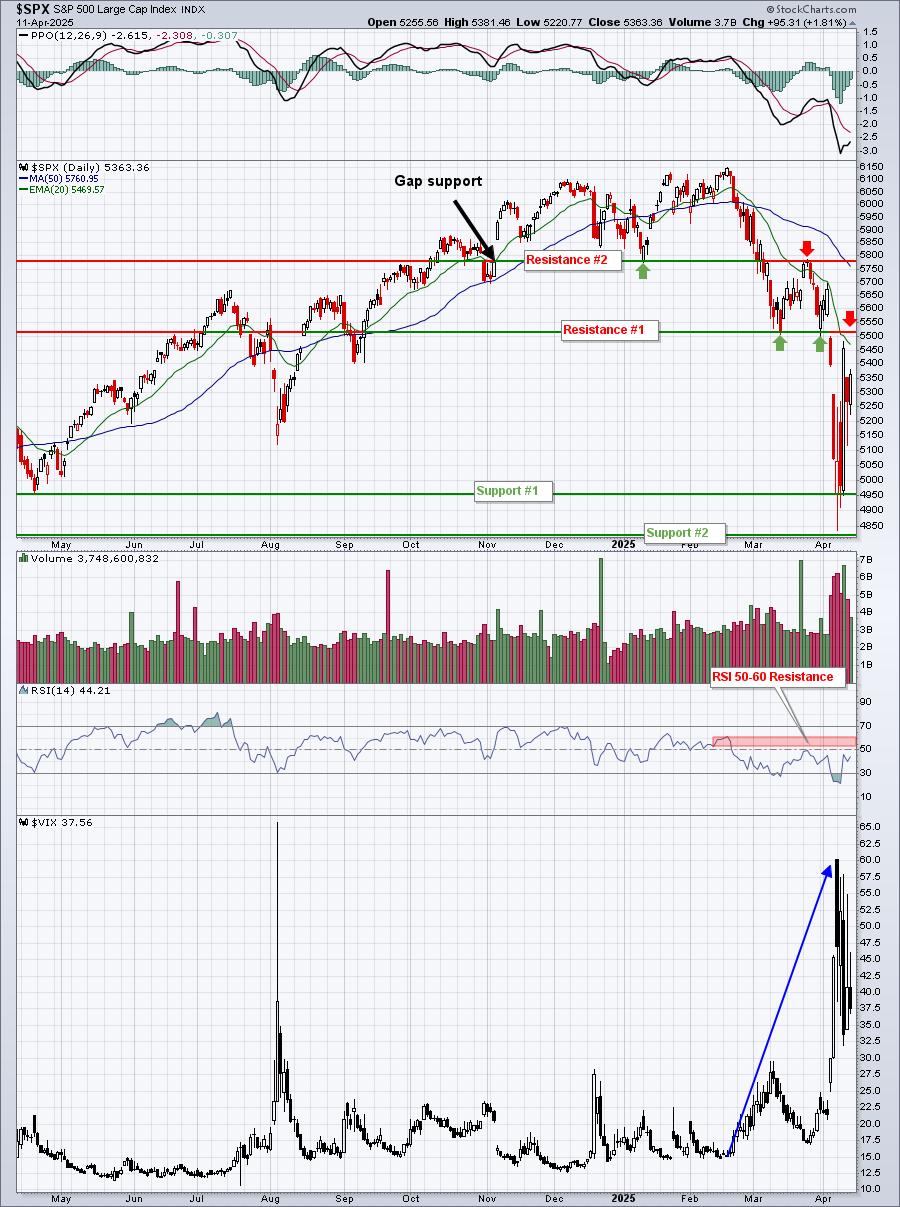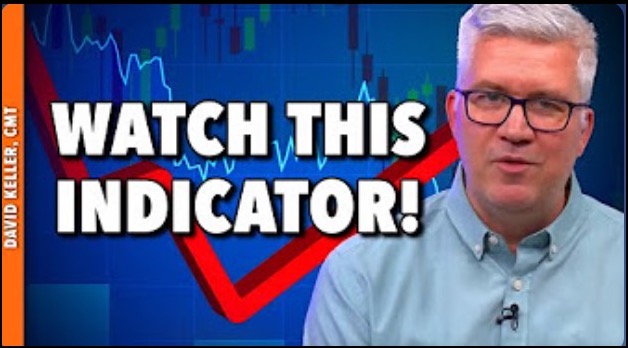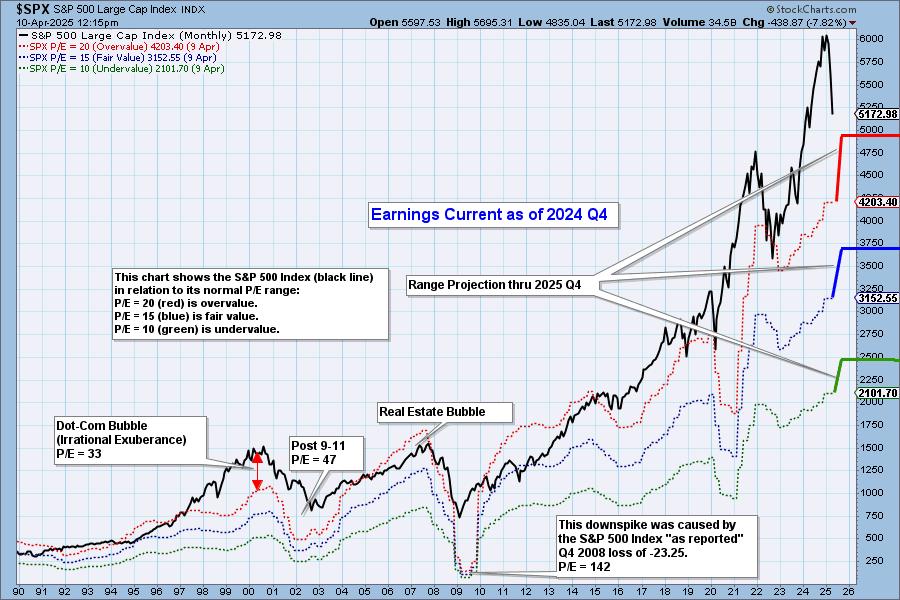Stocks started the week mixed with the Russell 2000 ETF (IWM) edging higher and the S&P 500 ETF (SPY) edging lower. And I do mean "edging" because the moves were fractional. The sectors were also mixed with the Basic Materials SPDR (XLB) falling around 1% and the Technology SPDR (XLK) advancing .34% as Apple firmed. Industry group ETFs within the materials sector were hit again with GDX, SIL, SLX and XME falling 1% or more. Despite some pockets of weakness in the materials sector, the overall picture remains unchanged for the markets. Stocks are overbought, but in clear uptrends (short, medium and long-term). Treasuries are moving lower as money shifts from safety to risk. Oil and the Euro are taking part in the risk-on trade. Gold remains the odd asset because it is not taking advantage of a weak Dollar. Perhaps gold is foreshadowing a bounce in the Dollar. The biggest quantitative easer in the world starts its two day meeting today with a policy statement scheduled for Wednesday. The Fed is walking a serious tightrope as the need for quantitative easing diminishes and Treasuries start to fall from lofty levels. Any hints of less quantitative easing would be bullish for the Dollar, bearish for gold and bearish for Treasuries. I do not know when the Fed will start signaling its shift, but Treasuries are unlikely to take this shift in stride. Any price move is likely to be sharp and dramatic. As the 20+ Year T-Bond ETF (TLT) chart below shows, even a reversion to the broken resistance zone in the 100-105 area would cause a 10% decline. Also notice that the monthly Percent Price Oscillator (PPO) moved below its signal line for the first time since June 2011.





**************************************************************************

**************************************************************************

**************************************************************************

**************************************************************************

**************************************************************************
Key Reports and Events:
Tue - Jan 29 - 09:00 - Case-Shiller Housing Index
Tue - Jan 29 - 10:00 - Consumer Confidence
Wed - Jan 30 - 07:00 - MBA Mortgage Index
Wed - Jan 30 - 08:15 - ADP Employment Report
Wed - Jan 30 - 08:30 - GDP
Wed - Jan 30 - 10:30 - Oil Inventories
Wed - Jan 30 - 14:15 - FOMC Policy Statement
Thu - Jan 31 - 07:30 - Challenger Job Cuts
Thu - Jan 31 - 08:30 - Jobless Claims
Thu - Jan 31 - 08:30 - Personal Income & Spending
Thu - Jan 31 - 09:45 - Chicago PMI
Thu - Jan 31 - 10:30 - Natural Gas Inventories
Fri - Feb 01 - 08:30 – Employment Report
Fri - Feb 01 - 09:55 - Michigan Sentiment
Fri - Feb 01 - 10:00 - ISM Index
Fri - Feb 01 - 10:00 - Construction Spending
Fri - Feb 01 - 14:00 - Auto/Sales
Fri – Mar 01 - 23:59 – Sequester Takes Effect
Wed – Mar 27 - 23:59 – Government Shut Down Deadline
Wed – May 15 - 23:59 – New Debt Ceiling Deadline
Charts of Interest: Tuesday and Thursday
This commentary and charts-of-interest are designed to stimulate thinking. This analysis is
not a recommendation to buy, sell, hold or sell short any security (stock ETF or otherwise).
We all need to think for ourselves when it comes to trading our own accounts. First, it is
the only way to really learn. Second, we are the only ones responsible for our decisions.
Think of these charts as food for further analysis. Before making a trade, it is important
to have a plan. Plan the trade and trade the plan. Among other things, this includes setting
a trigger level, a target area and a stop-loss level. It is also important to plan for three
possible price movements: advance, decline or sideways. Have a plan for all three scenarios
BEFORE making the trade. Consider possible holding times. And finally, look at overall market
conditions and sector/industry performance.

About the author:
Arthur Hill, CMT, is the Chief Technical Strategist at TrendInvestorPro.com. Focusing predominantly on US equities and ETFs, his systematic approach of identifying trend, finding signals within the trend, and setting key price levels has made him an esteemed market technician. Arthur has written articles for numerous financial publications including Barrons and Stocks & Commodities Magazine. In addition to his Chartered Market Technician (CMT) designation, he holds an MBA from the Cass Business School at City University in London.
Learn More





